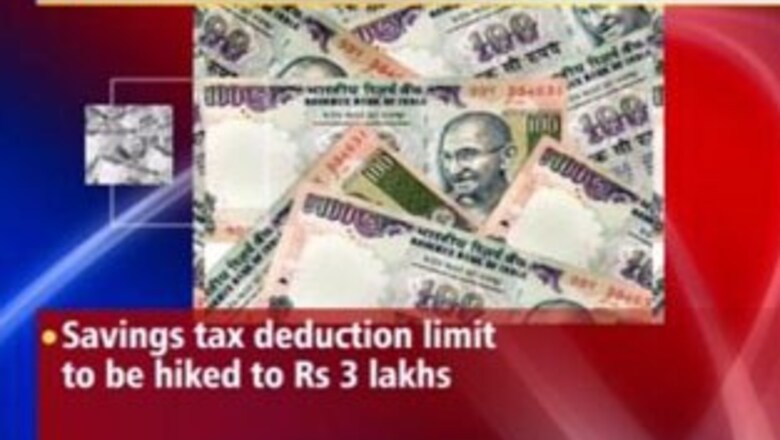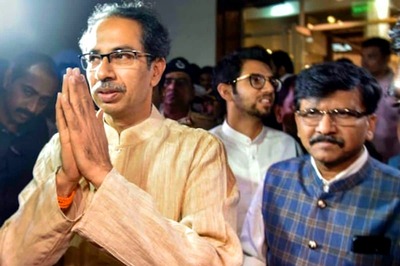
views
New Delhi: The Union Government on Wednesday initiated radical tax reforms through a draft code that aims at moderating income tax rates, abolishing Securities Transaction Tax and increasing deduction for savings up to Rs 3 lakh.
Releasing the Direct Taxes Code that will ultimately replace the over four-decades old Income Tax Act and bring all other direct taxes like wealth tax under its purview, Finance Minister Pranab Mukherjee on Wednesday said if reasonable level of discussion happens on the code, a bill could be placed in the Winter Session of Parliament.
The code proposes to exempt the general tax payer from paying income tax if his income is Rs 1,60,000 in a year. He would pay just 10 per cent up to Rs 10 lakh, 20 per cent beyond that and Rs 25 lakh and 30 per cent beyond Rs 25 lakh.
Currently, the general income tax payer does not pay tax till Rs 1,60,000 of income in a year. However, he pays 10 per cent tax on income between Rs 1,60,000 and Rs 3 lakh, 20 per cent between Rs three lakh and Rs five lakh and 30 per cent beyond Rs 5 lakh.
"We expect to have better compliance and better collection of taxes," Mukherjee said.
While the code proposes abolition of the controversial STT, it also suggests reintroduction of tax on long term capital gains on securities trading.
Home Minister P Chidambaram, who during his tenure in the Finance Ministry had initiated work on the Code, said that this was a brand new Code written from scratch.
However, all capital gains arising before Apirl one, 2000, will be exempted.
The code also proposed to increase tax deduction on savings to Rs 3 lakh.
Besides, the code suggests that all perquisites be included in salary income of the assessee for the purpose of income tax.
It further proposes that retirement benefits be exempted from tax, only if saved in Retirement Benefits Account.
All withdrawals from the accounts will be taxed to encourage long-term savings, as per the proposals.
It also suggests replacing the current profit-linked tax incentives for businesses with investment-linked incentives.
The code also suggests introduction of general anti-avoidance rule to combat tax avoidance.
It also proposes rationalisation of tax provisions for amalgamations and demerger so that tax remains neutral when businesses reorganise.
"The thrust of the code is to improve the efficiency and equity of our tax system by eliminating distortions in the tax structure, introducing moderate levels of taxation and expanding the tax base," Mukherjee said.
He said the attempt is to simplify the language to enable better comprehension and remove ambiguity to foster voluntary compliance.
"All the direct tax laws - wealth tax laws, FBT and Income Tax laws - have all been brought under one umbrella, a single direct tax code. The second feature is that the language is very simple," he added.
PAGE_BREAK
Home Minister P Chidambaram, who conceived the new code, said that the present IT Act had virtually become happy hunting ground for lawyers.
Chidambaram said, "The code (Income Tax Act, 1961), in fact, became a virtual happy hunting ground for lawyers. If anyone was happy with the (existing) code it was legal fraternity."
He said there is no point in referring to income tax provisions, while discussing the new draft code as this will not amend the old law, but replace it.
Chidambaram also said the underlying philosophy behind the code is the philosophy of the government, which is wedded to well-regulated free market system.
He said probably the code will become law by 2011, which will be the golden jubilee of the Income Tax Act.
In his Budget speech on July 6, Mukherjee had promised to bring the draft code within 45 days for the public comment. However, the code was released over a week before the scheduled time.
Highlights of Direct Taxes Code draft
- The code is expected to replace the Income Tax Act, 1961 after it becomes a law.
- Proposes moderate Income Tax rates
- Maintains tax exemption at Rs 1.60 lakh income a year
- 10 per cent tax on income of Rs 1.6-10 lakh
- 20 per cent on income over Rs 10 lakh up to Rs 25 lakh
- 30 per cent on income beyond Rs 25 lakh
- Adding of perks in income for taxation
- Corporate Tax rate to be 25 per cent against 30 per cent
- Wealth Tax to be levied on wealth over Rs 50 crore
- Abolition of Securities Transaction Tax
- Re-introduction of long-term capital gains tax
- Raising of tax deduction on savings to Rs 3 lakh
- Introduction of anti-avoidance rule
"We find that the tax slabs are really going to be very interesting apart from the basic exemption, which at present is Rs 1.6 lakh for men and Rs 1.9 lakh for women tax payers and Rs 2.4 lakh for senior citizens. The next slab that is very important is on income upto Rs 10 lakh. The income tax liability will only be 10 per cent on this. Most of the tax payers would be very happy because of this announcement," said tax expert Subhash Lakhotia.


















Comments
0 comment